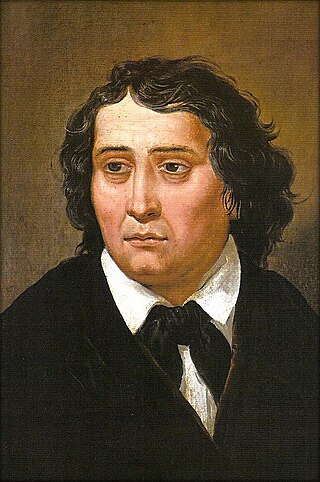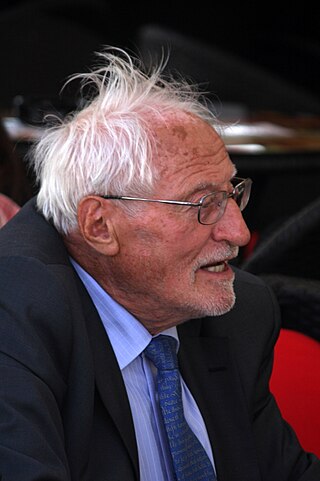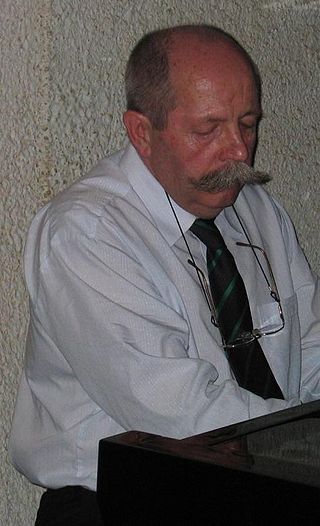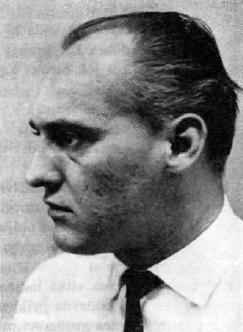Related Research Articles

Taja Kramberger is a Slovenian poet, translator, essayist and historical anthropologist from Slovenia. She lives in France.

France Prešeren was a 19th-century Romantic Slovene poet whose poems have been translated into many languages.

Simon Jenko was a Slovene poet, lyricist and writer.

Oton Župančič was a Slovene poet, translator, and playwright. He is regarded, alongside Ivan Cankar, Dragotin Kette and Josip Murn, as the beginner of modernism in Slovene literature. In the period following World War I, Župančič was frequently regarded as the greatest Slovenian poet after Prešeren, but in the last forty years his influence has been declining and his poetry has lost much of its initial appeal.

Tomaž Šalamun was a Slovenian poet who was a leading figure of postwar neo-avant-garde poetry in Central Europe and an internationally acclaimed absurdist. His books of Slovene poetry have been translated into twenty-one languages, with nine of his thirty-nine books of poetry published in English. His work has been called a poetic bridge between old European roots and America. Šalamun was a member of the Slovenian Academy of Sciences and Arts. He lived in Ljubljana, Slovenia, and was married to the painter Metka Krašovec.

Aleš Šteger is a Slovene poet, writer, editor and literary critic. Aleš belongs to a generation of writers that started to publish right after the fall of Yugoslavia. His first poetry collection Šahovnice ur (1995) was sold out in three weeks after publication and indicated a new generation of Slovenian artists and writers.
Josip Osti was a Bosnian and Slovenian poet, prose writer and essayist, literary critic, anthologist and translator.

Iztok Osojnik is a Slovene poet and essayist. Between 1997 and 2004 he was the director of the Vilenica International Literary Festival organized by the Slovene Writers' Association.

Tone Pavček was one of the most influential Slovene poets, translators, and essayists from the first post-war generation. He published numerous collections of poetry, well received by readers and critics alike. He also translated a number of Russian works into Slovene.

Milan Dekleva is a Slovene poet, writer, playwright, composer and journalist.

Kajetan Kovič was a Slovene poet, writer, translator, and journalist. In 1978, he received the Prešeren Award, the highest artistic award in Slovenia, for his poetry collection Labrador.
Mojca Kumerdej is a Slovene writer, philosopher and critic. She works as the cultural chronicler for the daily newspaper Delo.
The Slovene Writers' Association is a non-profit association of Slovene writers based in Ljubljana.

Milan Jesih is a Slovene poet, playwright, and translator. He was the president of the Slovene Writers' Association between 2009 and 2011.

Jurij Hudolin is a Slovene poet, writer, columnist and translator. He has published a number of poetry collections and novels and is known for the rich language he uses and a rebellious rejectionist stance towards the world.
Andrej Medved is a Slovene poet, editor and translator. He has published numerous poetry collections.
Uroš Zupan is a Slovene poet and translator. He has published numerous collections of poetry and his poetry has also been translated into German, Polish, Czech, Slovak, English, Serbian and Croatian.
Marjan Strojan is a Slovene poet, journalist and translator. He studied Comparative literature and Philosophy at the University of Ljubljana and worked as a journalist at the Slovene section of the BBC World Service and as a film critic and literary editor at Radio Slovenija. He has written a number of volumes of poetry and translated Beowulf, Geoffrey Chaucer's Canterbury Tales, Milton's Paradise Lost and Sonnets as well as poems by William Shakespeare, Robert Frost, James Joyce, Sydney Lea and others into Slovene. He has also edited and in part translated the first comprehensive anthology of English poetry in Slovene. Strojan has written a number of essays, papers and studies on English poetry and contributed to the South Slavic Miltoniana. From 2009 to 2016 he was the president of the Slovenian section of PEN International.

Ivan Minatti was a Slovene poet, translator, and editor. He started writing poetry before World War II, but principally belongs to the first postwar generation of Slovene poets. He is one of the best representatives of Slovene Intimism.
Katja Perat is a Slovenian novelist, essayist, and poet currently based in the U.S. A graduate of Philosophy and Comparative Literature from the University of Ljubljana Faculty of Arts, her books of poetry have been nominated for numerous awards in Slovenia. Her work has been noted for its frequent criticism of the Slovene national press.
References
- ↑ Poetry International site
- ↑ "Slovene Writers' Association site". Slovene writers' portal (in Slovenian). DSP Slovene Writers' Association. Archived from the original on 19 September 2011. Retrieved 16 January 2011.
- ↑ Veronika Award official site